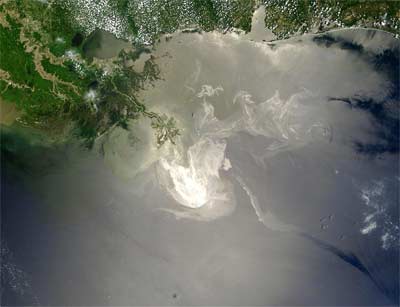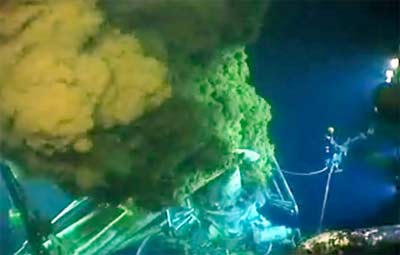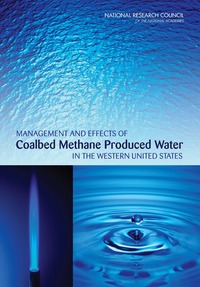This booklet provides an introduction to drinking water issues. It draws from a body of independent, peer-reviewed expert consensus reports from the National Research Council to provide an overview of public water supply and demand, water management and conservation, options for the government and the private sector, and the economic and ecological
aspects of drinking water.
See the Division of Earth and Life Studies.
Key Finding
Authoring Organizations

Photo: UC Santa Barbara Geography Department. The Deepwater Horizon oil spill in the Gulf of Mexico as seen from space by NASA's Terra satellite on May 24, 2010. The spill has yet to be contained and is the worst oil spill in US history.

View of the Macondo well leaking oil in the Gulf of Mexico.
The subject of gas drilling in the Marcellus may be looked at in its historical, legal and scientific contexts. The need to heal the ineffective and mistrustful relationship between environmentalists, the U.S. government and the international energy industry concerning the preservation of American air and water becomes more urgent by seeing images like these.
See: Kara Cusolito. The Nation. "The Next Drilling Disaster".
On Sunday, Sept. 26, a committee of the National Academy of Engineering and National Research Council that is conducting an analysis of the causes of the Deepwater Horizon explosion and oil spill held a public meeting to hear from Mark Bly, group head of safety and operations for BP, and other company representatives about BP's recently released accident investigation report. Also on the agenda were executives from Halliburton and Shell Oil.
- Photos
- Webcast Audio Part 1 (Opening Remarks, BP Presentation)
- Webcast Audio Part 2 (Q&A with Committee and BP)
- Webcast Audio Part 3 (Halliburton Presentation and Q&A)
- Webcast Audio Part 4 (Shell Presentation and Q&A)
- Meeting Agenda
- Project Information
See: "More Questions About BP’s Limited Investigation Into Gulf Disaster".
See: Dave Cohen. Energy Bulletin. "Shale Gas Shenanigans."
See: National Commission on the BP Deepwater Horizon Oil Spill and Offshore Drilling
See: The Questions BP Didn’t Answer
See: Tracking the Oil Spill in the Gulf | Interactive Map
For more on the estimates, see these articles:
May 14: Size of Oil Spill Underestimated, Scientists Say
May 28: Estimates Suggest Spill Is Biggest in U.S. History
June 7: Rate of Oil Leak, Still Not Clear, Puts Doubt on BP
June 10: New Estimates Double Rate of Oil Leak
June 15: Panel Sharply Raises Estimate of Oil Spill
Aug. 2: Gulf Spill Is the Largest of Its Kind
See: Cain Burdeau. "Scientists Find Damage to Coral Near BP Well." AP. Coastal Care. Nov. 6, 2010.
See: Peter Hart. July 2010. "Still Drill, Baby—Despite Spill
Little rethinking of oil after Deepwater disaster." FAIR. (Fairness and Accuracy in Reporting)
See New Book:
Institute of Medicine, Margaret A. Mccoy, and Judith A. Salerno. Assessing the Effects of the Gulf of Mexico Oil Spill on Human Health: A Summary of the June 2010 Workshop. National Academies Press, 2010.







